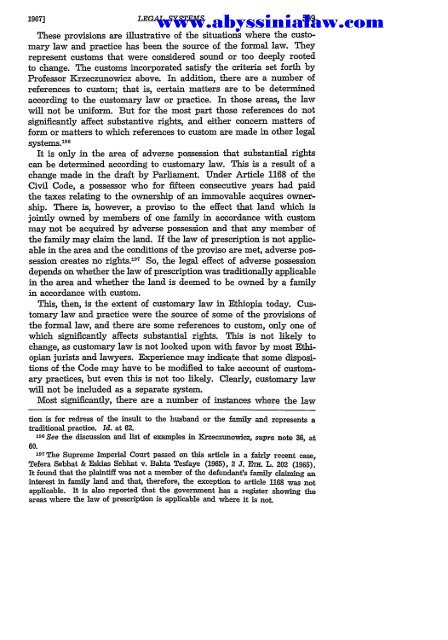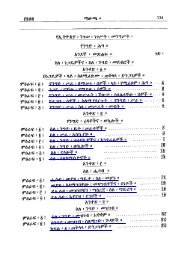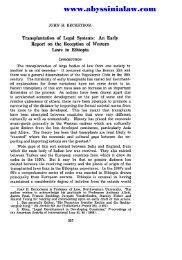You also want an ePaper? Increase the reach of your titles
YUMPU automatically turns print PDFs into web optimized ePapers that Google loves.
1967] LEGAL SYSTEMS<br />
www.abyssinialaw.com<br />
These provisions are illustrative of the situations where the customary<br />
law and practice has been the source of the formal law. They<br />
represent customs that were considered sound or too deeply rooted<br />
to change. The customs incorporated satisfy the criteria set forth by<br />
Professor Krzeczunowicz above. In addition, there are a number of<br />
references to custom; that is, certain matters are to be determined<br />
according to the customary law or practice. In those areas, the law<br />
will not be uniform. But for the most part those references do not<br />
significantly affect substantive rights, and either concern matters of<br />
form or matters to which references to custom are made in other legal<br />
systems. 196<br />
It is only in the area of adverse possession that substantial rights<br />
can be determined according to customary law. This is a result of a<br />
change made in the draft by Parliament. Under Article 1168 of the<br />
Civil Code, a possessor who for fifteen consecutive years had paid<br />
the taxes relating to the ownership of an immovable acquires ownership.<br />
There is, however, a proviso to the effect that land which is<br />
jointly owned by members of one family in accordance with custom<br />
may not be acquired by adverse possession and that any member of<br />
the family may claim the land. If the law of prescription is not applicable<br />
in the area and the conditions of the proviso are met, adverse possession<br />
creates no rights. 197 So, the legal effect of adverse possession<br />
depends on whether the law of prescription was traditionally applicable<br />
in the area and whether the land is deemed to be owned by a family<br />
in accordance with custom.<br />
This, then, is the extent of customary law in Ethiopia today. Customary<br />
law and practice were the source of some of the provisions of<br />
the formal law, and there are some references to custom, only one of<br />
which significantly affects substantial rights. This is not likely to<br />
change, as customary law is not looked upon with favor by most Ethiopian<br />
jurists and lawyers. Experience may indicate that some dispositions<br />
of the Code may have to be modified to take account of customary<br />
practices, but even this is not too likely. Clearly, customary law<br />
will not be included as a separate system.<br />
Most significantly, there are a number of instances where the law<br />
tion is for redress of the insult to the husband or the family and represents a<br />
traditional practice. Id. at 62.<br />
196 See the discussion and list of examples in Krzeczunowicz, supra note 36, at<br />
60. 197 The Supreme Imperial Court passed on this article in a fairly recent case,<br />
Tefera Sebhat & Eskias Sebhat v. Bahta Tesfaye (1965), 2 J. ET. L. 202 (1965).<br />
It found that the plaintiff was not a member of the defendant's family claiming an<br />
interest in family land and that, therefore, the exception to article 1168 was not<br />
applicable. It is also reported that the government has a register showing the<br />
areas where the law of prescription is applicable and where it is not.





